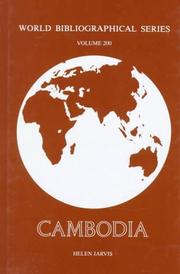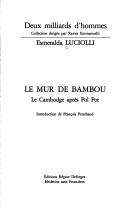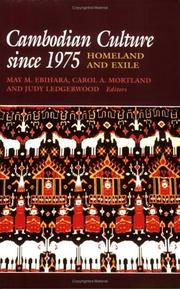| Listing 1 - 10 of 61 | << page >> |
Sort by
|
Book
ISBN: 2130378382 9782130378389 Year: 1983 Volume: 2080 Publisher: Paris PUF
Abstract | Keywords | Export | Availability | Bookmark
 Loading...
Loading...Choose an application
- Reference Manager
- EndNote
- RefWorks (Direct export to RefWorks)
Regional documentation --- Cambodia --- Cambodge --- Geography --- History --- 308 <596> --- Cambodia. --- Khmer Republic --- Cam Bot --- Cambotja --- République khmère --- Kambodscha --- Kamboja --- Kambodža --- Tchin-la --- Chien-pʻu-chai --- Democratic Kampuchea --- Kambujā --- Democratic Cambodia --- Camboja --- Preah Reach Ana Chak Kampuchea --- Kâmpŭchéa Prâchéathĭpâteyy --- Kampuchea démocratique --- République du Cambodge --- Campuchia --- Kampuchea (Coalition Government, 1983- ) --- Kampuchea --- Kampuchii︠a︡ --- Kamphūchā --- Kingdom of Cambodia --- Preăhréachéanachâkr Kâmpŭchéa --- Cambogia --- Roat Kampuchea --- State of Cambodia --- Cambodja --- Royal Government of Cambodia --- French Indochina --- Braḥrājāṇacakr Kambujā --- Rājraṭṭhabhipāl Kambujā

ISBN: 1851091777 9781851091775 Year: 1997 Volume: 200 Publisher: Oxford Clio
Abstract | Keywords | Export | Availability | Bookmark
 Loading...
Loading...Choose an application
- Reference Manager
- EndNote
- RefWorks (Direct export to RefWorks)
Cambodia --- Bibliography --- 908 <596> --- Heemkunde. Area studies--Cambodja. Kampuchea --- Bibliography. --- 908 <596> Heemkunde. Area studies--Cambodja. Kampuchea --- Cambodge --- Khmer Republic --- Cam Bot --- Cambotja --- République khmère --- Kambodscha --- Kamboja --- Kambodža --- Tchin-la --- Chien-pʻu-chai --- Democratic Kampuchea --- Kambujā --- Democratic Cambodia --- Camboja --- Preah Reach Ana Chak Kampuchea --- Kâmpŭchéa Prâchéathĭpâteyy --- Kampuchea démocratique --- République du Cambodge --- Campuchia --- Kampuchea (Coalition Government, 1983- ) --- Kampuchea --- Kampuchii︠a︡ --- Kamphūchā --- Kingdom of Cambodia --- Preăhréachéanachâkr Kâmpŭchéa --- Cambogia --- Roat Kampuchea --- State of Cambodia --- Cambodja --- Royal Government of Cambodia --- French Indochina --- Braḥrājāṇacakr Kambujā --- Rājraṭṭhabhipāl Kambujā --- Cambodia - Bibliography
Book
ISBN: 9748495914 Year: 1993 Publisher: White lotus
Abstract | Keywords | Export | Availability | Bookmark
 Loading...
Loading...Choose an application
- Reference Manager
- EndNote
- RefWorks (Direct export to RefWorks)
|00004/TH --- Cambodia --- Politics and government --- French Indochina --- Cambodge --- Khmer Republic --- Cam Bot --- Cambotja --- République khmère --- Kambodscha --- Kamboja --- Kambodža --- Tchin-la --- Chien-pʻu-chai --- Democratic Kampuchea --- Kambujā --- Democratic Cambodia --- Camboja --- Preah Reach Ana Chak Kampuchea --- Kâmpŭchéa Prâchéathĭpâteyy --- Kampuchea démocratique --- République du Cambodge --- Campuchia --- Kampuchea (Coalition Government, 1983- ) --- Kampuchea --- Kampuchii︠a︡ --- Kamphūchā --- Kingdom of Cambodia --- Preăhréachéanachâkr Kâmpŭchéa --- Cambogia --- Roat Kampuchea --- State of Cambodia --- Cambodja --- Royal Government of Cambodia --- Braḥrājāṇacakr Kambujā --- Rājraṭṭhabhipāl Kambujā
Book
ISBN: 086091805X Year: 1985 Publisher: Verso
Abstract | Keywords | Export | Availability | Bookmark
 Loading...
Loading...Choose an application
- Reference Manager
- EndNote
- RefWorks (Direct export to RefWorks)
Communism --- Bolshevism --- Communist movements --- Leninism --- Maoism --- Marxism --- Trotskyism --- Collectivism --- Totalitarianism --- Post-communism --- Socialism --- Village communities --- History --- Cambodia --- Cambodge --- Khmer Republic --- Cam Bot --- Cambotja --- République khmère --- Kambodscha --- Kamboja --- Kambodža --- Tchin-la --- Chien-pʻu-chai --- Democratic Kampuchea --- Kambujā --- Democratic Cambodia --- Camboja --- Preah Reach Ana Chak Kampuchea --- Kâmpŭchéa Prâchéathĭpâteyy --- Kampuchea démocratique --- République du Cambodge --- Campuchia --- Kampuchea (Coalition Government, 1983- ) --- Kampuchea --- Kampuchii︠a︡ --- Kamphūchā --- Kingdom of Cambodia --- Preăhréachéanachâkr Kâmpŭchéa --- Cambogia --- Roat Kampuchea --- State of Cambodia --- Cambodja --- Royal Government of Cambodia --- French Indochina --- Politics and government --- Braḥrājāṇacakr Kambujā --- Rājraṭṭhabhipāl Kambujā
Book
ISBN: 997169719X 9971694999 Year: 2010 Publisher: Singapore NUS Press
Abstract | Keywords | Export | Availability | Bookmark
 Loading...
Loading...Choose an application
- Reference Manager
- EndNote
- RefWorks (Direct export to RefWorks)
While colonization, protracted war and violent revolution are commonly blamed for Cambodia's failure to modernize its economy in the twentieth century, Margaret Slocomb's Economic History of Cambodia in the Twentieth Century questions whether these circumstances changed the underlying structures and relations of production. She also asks whether economic factors in some way instigated war and revolution. In exploring these issues, the book tracks the erratic path taken by Cambodia's political elite and colonial rulers to develop a national economy. The book closes around 2005, by which time Cambodia had be reintegrated into both the regional and into the global economy as a fully-fledged member of the World Trade Organization. Drawing on resources from the State Archives of Cambodia, this book is relevant to investors, aid workers and development specialists seeking to understand the shift from a traditional to a modern market economy.
Business & Economics / Economic History --- Economics --- Economic theory --- Political economy --- Social sciences --- Economic man --- Cambodia --- Economic policy. --- Economic conditions --- Cambodge --- Khmer Republic --- Cam Bot --- Cambotja --- République khmère --- Kambodscha --- Kamboja --- Kambodža --- Tchin-la --- Chien-pʻu-chai --- Democratic Kampuchea --- Kambujā --- Democratic Cambodia --- Camboja --- Preah Reach Ana Chak Kampuchea --- Kâmpŭchéa Prâchéathĭpâteyy --- Kampuchea démocratique --- République du Cambodge --- Campuchia --- Kampuchea (Coalition Government, 1983- ) --- Kampuchea --- Kampuchii︠a︡ --- Kamphūchā --- Kingdom of Cambodia --- Preăhréachéanachâkr Kâmpŭchéa --- Cambogia --- Roat Kampuchea --- State of Cambodia --- Cambodja --- Royal Government of Cambodia --- Braḥrājāṇacakr Kambujā --- Rājraṭṭhabhipāl Kambujā --- French Indochina

ISBN: 2905538333 Year: 1988 Publisher: Paris Deforges
Abstract | Keywords | Export | Availability | Bookmark
 Loading...
Loading...Choose an application
- Reference Manager
- EndNote
- RefWorks (Direct export to RefWorks)
341.33 --- 614.23 <1-772> --- Cambodia --- History --- anno 1980-1989 --- French Indochina --- Cambodge --- Khmer Republic --- Cam Bot --- Cambotja --- République khmère --- Kambodscha --- Kamboja --- Kambodža --- Tchin-la --- Chien-pʻu-chai --- Democratic Kampuchea --- Kambujā --- Democratic Cambodia --- Camboja --- Preah Reach Ana Chak Kampuchea --- Kâmpŭchéa Prâchéathĭpâteyy --- Kampuchea démocratique --- République du Cambodge --- Campuchia --- Kampuchea (Coalition Government, 1983- ) --- Kampuchea --- Kampuchii︠a︡ --- Kamphūchā --- Kingdom of Cambodia --- Preăhréachéanachâkr Kâmpŭchéa --- Cambogia --- Roat Kampuchea --- State of Cambodia --- Cambodja --- Royal Government of Cambodia --- Braḥrājāṇacakr Kambujā --- Rājraṭṭhabhipāl Kambujā
Book

ISBN: 1501719203 9781501719202 9780877277767 9780877277460 087727746X 0877277761 Year: 2018 Publisher: Ithaca, NY
Abstract | Keywords | Export | Availability | Bookmark
 Loading...
Loading...Choose an application
- Reference Manager
- EndNote
- RefWorks (Direct export to RefWorks)
Inspired by David Chandler's groundbreaking work on Cambodian attempts to find order in the aftermath of turmoil, these essays explore Cambodian history using a rich variety of sources that cast light on Khmer perceptions of violence, wildness, and order, examining the "forest" and cultured space, and the fraught "edge" where they meet.
Anthropology. --- HISTORY / Asia / Southeast Asia. --- Chandler, David P. --- Cambodge --- Cambodia --- Khmer Republic --- Cam Bot --- Cambotja --- République khmère --- Kambodscha --- Kamboja --- Kambodža --- Tchin-la --- Chien-pʻu-chai --- Democratic Kampuchea --- Kambujā --- Democratic Cambodia --- Camboja --- Preah Reach Ana Chak Kampuchea --- Kâmpŭchéa Prâchéathĭpâteyy --- Kampuchea démocratique --- République du Cambodge --- Campuchia --- Kampuchea (Coalition Government, 1983- ) --- Kampuchea --- Kampuchii︠a︡ --- Kamphūchā --- Kingdom of Cambodia --- Preăhréachéanachâkr Kâmpŭchéa --- Cambogia --- Roat Kampuchea --- State of Cambodia --- Cambodja --- Royal Government of Cambodia --- French Indochina --- Civilisation. --- Politique et gouvernement. --- Histoire. --- Civilization. --- Politics and government. --- History. --- Braḥrājāṇacakr Kambujā --- Rājraṭṭhabhipāl Kambujā


ISBN: 1501723855 9781501723858 9780801429675 0801429676 9780801481734 0801481732 Year: 2018 Publisher: Ithaca, NY
Abstract | Keywords | Export | Availability | Bookmark
 Loading...
Loading...Choose an application
- Reference Manager
- EndNote
- RefWorks (Direct export to RefWorks)
Since the civil war of the 1970s, Cambodia has suffered devastating upheavals that killed a million ' people and exiled hundreds of thousands. This book is the first to examine Cambodian culture after the ravages of the Pol Pot regime-and to bear witness to the transformation and persistence of tradition among contemporary Cambodians at home and abroad. Bringing together essays by Khmer and Western scholars in anthropology, linguistics, literature, and ethnomusicology, the volume documents the survival of a culture that many had believed lost. Individual chapters explore such topics as Buddhist belief and practice among refugees in the United States, distinctive features of modern Cambodian novels, the lessons taught by Khmer proverbs, some uses of metaphor by the Khmer Rouge regime, the state of traditional music, the recent revival of a form of traditional theater, the concept of pain in Khmer culture, changing conceptions of gender, and refugees' interpretation of American television. Together the essays map a contemporary Cambodian culture, which, for over two hundred thousand Khmers, is now firmly entwined in the social fabric of the urban West.
Khmer (Southeast Asian people) --- Khmer Krom (Southeast Asian people) --- Khmers --- Ethnology --- Cambodians --- Cambodia --- Cambodge --- Khmer Republic --- Cam Bot --- Cambotja --- République khmère --- Kambodscha --- Kamboja --- Kambodža --- Tchin-la --- Chien-pʻu-chai --- Democratic Kampuchea --- Kambujā --- Democratic Cambodia --- Camboja --- Preah Reach Ana Chak Kampuchea --- Kâmpŭchéa Prâchéathĭpâteyy --- Kampuchea démocratique --- République du Cambodge --- Campuchia --- Kampuchea (Coalition Government, 1983- ) --- Kampuchea --- Kampuchii︠a︡ --- Kamphūchā --- Kingdom of Cambodia --- Preăhréachéanachâkr Kâmpŭchéa --- Cambogia --- Roat Kampuchea --- State of Cambodia --- Cambodja --- Royal Government of Cambodia --- French Indochina --- Intellectual life. --- Politics and government --- Braḥrājāṇacakr Kambujā --- Rājraṭṭhabhipāl Kambujā
Book
ISBN: 1108590403 110855864X 1108612865 1108457932 Year: 2019 Publisher: Cambridge : Cambridge University Press,
Abstract | Keywords | Export | Availability | Bookmark
 Loading...
Loading...Choose an application
- Reference Manager
- EndNote
- RefWorks (Direct export to RefWorks)
Drawing data from multiple sources, Un argues that following the 1993 United Nations intervention to promote democracy, the Cambodian People's Party (CPP) perpetuated a patronage state weak in administrative capacity but strong in coercive capacity. This enabled them to maintain the presence of electoral authoritarianism, but increased political awareness among the public, the rise in political activism among community-based organizations and a united opposition led to the emergence of a counter-movement. Sensing that this counter-movement might be unstoppable, the CPP has returned Cambodia to authoritarianism, a move made possible in part by China's pivot to Cambodia.
Cambodia --- Cambodge --- Khmer Republic --- Cam Bot --- Cambotja --- République khmère --- Kambodscha --- Kamboja --- Kambodža --- Tchin-la --- Chien-pʻu-chai --- Democratic Kampuchea --- Kambujā --- Democratic Cambodia --- Camboja --- Preah Reach Ana Chak Kampuchea --- Kâmpŭchéa Prâchéathĭpâteyy --- Kampuchea démocratique --- République du Cambodge --- Campuchia --- Kampuchea (Coalition Government, 1983- ) --- Kampuchea --- Kampuchii︠a︡ --- Kamphūchā --- Kingdom of Cambodia --- Preăhréachéanachâkr Kâmpŭchéa --- Cambogia --- Roat Kampuchea --- State of Cambodia --- Cambodja --- Royal Government of Cambodia --- French Indochina --- Politics and government --- Braḥrājāṇacakr Kambujā --- Rājraṭṭhabhipāl Kambujā
Book
ISBN: 1316434532 1316435245 1316438082 1316435954 131643950X 1316271331 1107109116 110752119X 1316430278 Year: 2015 Publisher: Cambridge : Cambridge University Press,
Abstract | Keywords | Export | Availability | Bookmark
 Loading...
Loading...Choose an application
- Reference Manager
- EndNote
- RefWorks (Direct export to RefWorks)
In 1939, the German sociologist Norbert Elias published his groundbreaking work The Civilizing Process, which has come to be regarded as one of the most influential works of sociology today. In this insightful new study tracing the history of violence in Cambodia, the authors evaluate the extent to which Elias's theories can be applied in a non-western context. Drawing from historical and contemporary archival sources, constabulary statistics, victim surveys and newspaper reports, Broadhurst, Bouhours and Bouhours chart trends and forms of violence throughout Cambodia from the mid-nineteenth century through to the present day. Analysing periods of colonisation, anti-colonial wars, interdependence, civil war, the revolutionary terror of the 1970s and post-conflict development, the authors assess whether violence has decreased and whether such a decline can be attributed to Elias's civilising process, identifying a series of universal factors that have historically reduced violence.
Violence --- Violent behavior --- Social psychology --- History --- Cambodia --- Cambodge --- Khmer Republic --- Cam Bot --- Cambotja --- République khmère --- Kambodscha --- Kamboja --- Kambodža --- Tchin-la --- Chien-pʻu-chai --- Democratic Kampuchea --- Kambujā --- Democratic Cambodia --- Camboja --- Preah Reach Ana Chak Kampuchea --- Kâmpŭchéa Prâchéathĭpâteyy --- Kampuchea démocratique --- République du Cambodge --- Campuchia --- Kampuchea (Coalition Government, 1983- ) --- Kampuchea --- Kampuchii︠a︡ --- Kamphūchā --- Kingdom of Cambodia --- Preăhréachéanachâkr Kâmpŭchéa --- Cambogia --- Roat Kampuchea --- State of Cambodia --- Cambodja --- Royal Government of Cambodia --- French Indochina --- Social aspects --- Braḥrājāṇacakr Kambujā --- Rājraṭṭhabhipāl Kambujā
| Listing 1 - 10 of 61 | << page >> |
Sort by
|

 Search
Search Feedback
Feedback About UniCat
About UniCat  Help
Help News
News